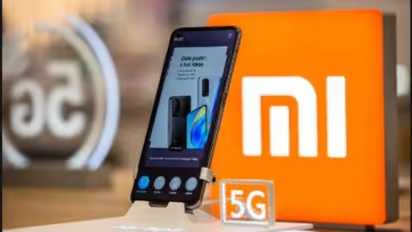Xiaomi branded as international war sponsor for selling smartphones in Russia

Synopsis
Xiaomi has refuted any allegations of supporting any war-related activities and declared its commitment to complying with all legal and regulatory requirements in all the regions where it conducts business. Girish Linganna reports
Chinese smartphone manufacturer Xiaomi along with its founder and CEO Lei Jun, and several other company executives have been accused of being "international war sponsors" by Ukraine's anti-corruption watchdog. The watch group alleges that the Beijing-based company continued its business activities in Russia despite the country's military actions.
According to a statement released by Ukraine's National Agency on Corruption Prevention (NACP) on Thursday, a company has been included in a list due to its continued operations in the Russian Federation even after Ukraine was fully invaded. The company has also been identified as the top seller of smartphones in Russia.
The NACP accused Xiaomi Corp of supporting a "terrorist state's" military aggression and stated that the company should face both legal and reputational repercussions for its involvement.
Xiaomi has refuted any allegations of supporting any war-related activities and declared its commitment to complying with all legal and regulatory requirements in all the regions where it conducts business.
When asked by The Post, Xiaomi stated that they are a producer of electronic devices intended for both personal and business use. They believe that everyone should have access to communication tools and online information, and their goal is to improve people's lives through innovative technology.
In February 2022, following the deployment of troops by President Vladimir Putin in Ukraine, numerous international brands withdrew from Russia. Within a week of this event, Apple and Samsung Electronics ceased the sale of their smartphones and other electronic devices in the country.
The departure of people has left a significant gap in the Russian market for different types of products that are commonly used by consumers. Due to the steep decline of the Russian currency, people in Russia rushed to purchase necessary electronic items, causing a significant increase in the sales of Chinese smartphones from companies such as Huawei Technologies Co, Oppo, and Vivo.
According to a report from CNN that cites data from Counterpoint Research, Xiaomi held over 50% of the smartphone market in Russia by the end of last year. This is in contrast to the third quarter of 2021 when they had a 26% market share, trailing behind Samsung's 34%, as per data from IDC, a market research company.
Xiaomi has been added to the list of 22 companies on Ukraine's war sponsor list, which includes China State Construction Engineering Corp and Procter & Gamble. However, Xiaomi is the only Chinese smartphone vendor on the list.
According to the website of the National Anti-Corruption Portal (NACP), any entities that are included in the list will be added to the World-Check database managed by Refinitiv, a data provider from the US and UK. This database is used by financial institutions worldwide to monitor individuals and organizations that pose a high risk.
Although a lot of tech companies from the Western region have enforced export limitations on their products being sold to Russia, Chinese companies have not followed the same path. This is mainly because Beijing doesn't support the sanctions imposed on Moscow by the United States.
According to Ivan Lam, an analyst at Counterpoint Research, even though major Chinese brands like Xiaomi want to increase sales in Western Europe, they need to consider the potential risks of doing business in Russia and expanding their operations there. This is because Western Europeans are largely opposed to the invasion of Ukraine. Lam shared these thoughts in an interview with the Post last year.
On Thursday, Fitch Rating released a research note stating that despite the prevalent anti-war sentiment in Europe, Xiaomi is predicted to experience further market growth due to its robust online sales platform.
IDC reported that Xiaomi held a market share of almost 13% last year, making it the third-largest smartphone vendor globally.
Check the Breaking News Today and Latest News from across India and around the world. Stay updated with the latest World News and global developments from politics to economy and current affairs. Get in-depth coverage of China News, Europe News, Pakistan News, and South Asia News, along with top headlines from the UK and US. Follow expert analysis, international trends, and breaking updates from around the globe. Download the Asianet News Official App from the Android Play Store and iPhone App Store for accurate and timely news updates anytime, anywhere.